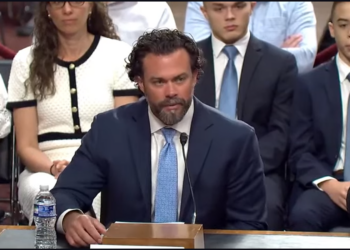In my recent Profile of Valor on MG Patrick Henry Brady, I noted his dedication to the Medal of Honor Society’s educational initiatives promoting the core values common to recipients: Courage, Sacrifice, Patriotism, Citizenship, Integrity, and Commitment.
One characteristic also common to the recipients I know: Humor!
Those who have stared death in the face — and there are many Veterans among our readers who have done just that — tend to appreciate life more than those who have not. That includes keeping things in proper perspective and finding what is good and right in others. It also includes keeping things light, meaning they can joke large and smile big.
I found that to be very true in my interactions with an otherwise battle-hardened Marine, Col Harvey “Barney” Barnum Jr.
Barney Barnum was born in 1940, a native of Cheshire, Connecticut. His parents, Harvey and Ann, were very involved in his and his younger brother’s lives. He was an active Boy Scout and a great football and baseball player. He was also president of his senior class. His first interest in the Marine Corps stemmed from a recruiter’s visit to his high school. As he recalls, that gunnery sergeant glared at the seniors in front of him and growled: “There is no one here worthy of being a United States Marine. I’m deplored that the faculty in the back of the room would let the students carry on like this. There isn’t anybody here I want in my Marine Corps.”
Marine recruiters are famous for lines like that because it causes those with Marine potential to step forward and assert they damn well are worthy. It worked with Barney, who says, “[That recruiter] epitomized what I thought the military was all about — he stood up and took charge and made a big impression on this young 18-year-old.”
After graduation, Barney went to Saint Anselm College in New Hampshire, where in November 1958 he joined the Marine Corps’ Platoon Leaders Class, a summer curriculum similar to ROTC. Upon graduation in 1962, he was commissioned in the Marine Reserve as a 2ndLt. He was then ordered to complete two Marine Corps Schools at Quantico, Virginia, The Basic School and the Artillery Officers Orientation Course. In 1963, he joined Battery A, 1st Battalion, 12th Marines, 3rd Marine Division on Okinawa, Japan, where he would matriculate into the active-duty Marine Corps and was promoted to 1stLt.
He deployed to Vietnam in December 1965 with Company H, 2nd Battalion of the 9th Marines Regiment, 3rd Marine Division, and a week later, on 18 December, found himself in the thick of a life-and-death battle, quickly distinguishing himself in combat. He says, “I had only been a forward observer four days on Operation Harvest Moon when we were ambushed and taking intense fire.”
His Marine Patrol was deep into enemy territory in South Vietnam’s Quang Tin Province when they were ambushed by a large NVA force. “It was the first time I’d been shot at,” Barney said. “So, I hit the deck.” Seeing that his Company commander, Capt Paul Gormleyand, was severely injured in the opening volley, he braved enemy fire to get to Gormleyand, who died in Barney’s arms after he carried him back to their line. He recalled, “The way the Communists fight is they take the commander out first.”
Their radio operator had also been killed. “When I … looked around, I could see all these young Marines’ eyes looking at me, and they’re saying, ‘OK, lieutenant, what the hell are we going to do?’” He recalls, “I was scared, but officers have to learn how to control fear and not exhibit fear. When we got ambushed, and the Company commander was killed, I knew what we needed — teamwork. … At that point, I started doing what lieutenants do, and that’s giving direction.” He knew he had to retrieve the radio: “So, I ran out, took the radio off the dead operator, carried it back, and strapped it to myself. I got on the phone, called the battalion commander, and told him what happened and that I was assuming command.”
He assumed command of his Company and rallied the remaining Marines to formulate a counterattack as he called for intense artillery support. His battalion commander advised by radio that there was no way to extract his men from their current position and that they would have to fight their way to the nearby village or hold their position overnight. But he knew holding overnight would not be possible: “Casualties were mounting rapidly. Ammunition was getting low, and the ceiling was closing in on us. I didn’t think our chances were going to be very good if we stayed.”
He ordered several Marines to clear a landing zone for evacuation of the wounded and dead before it got too hot for anyone else to land. He then began coordinating curtains of suppression fire toward the enemy trench lines as two Huey gunships arrived overhead for air support. He picked up a rocket launcher and, fully exposed to enemy fire, sent three rockets blazing toward the enemy position so the Huey pilots would know where to lay down their fire.
As soon as the air attack commenced, it allowed for two helicopters to land and evacuate the wounded and dead.
Barney and the remaining Marines then destroyed their packs and non-working equipment “to make ourselves light,” and, still surrounded by the enemy, he began coordinating their exfil to a village where they could defend themselves. That required crossing 500 meters of open fields and rice paddies to the relative safety of the nearby village. Under intense fire, that 500 meters felt like 500 miles.
Barney says, “Squad by squad, when I said ‘go,’ I said, ‘Run as fast as you can. Don’t even stop. The only time you stop is if someone gets shot and you pick them up.’” It took about 45 minutes, but he was not leaving his position until all 135 men in his Company had made it across the open ground. And they all made it to the village where they and the rest of their battalion could successfully evacuate.
For his courageous actions that bloody day, Barney was awarded the Medal of Honor.
According to his MoH citation: “His sound and swift decisions and his obvious calm served to stabilize the badly decimated units and his gallant example as he stood exposed repeatedly to point out targets served as an inspiration to all. Provided with two armed helicopters, he moved fearlessly through enemy fire to control the air attacks against the firmly entrenched enemy while skillfully directing one platoon in a successful counterattack on the key enemy positions.”
You can listen to his account of their actions here:
Barney was promoted to Captain in 1966 and returned to Vietnam in October 1968 to command the same battery he had served with during his first deployment.
He retired from active duty in August 1989 after 27 years of service. Having separated from his first love, the Marine Corps, Barney then married Martha Hill, and they just celebrated their 32nd anniversary.
He then served as the Principal Director, Drug Enforcement Policy, Office of the Secretary of Defense until 2001, when he began eight years as George W. Bush’s Deputy Assistant Secretary of the Navy for Reserve Affairs. He would also serve as president of the Congressional Medal of Honor Society.
On Medal of Honor Day (25 March) this year, he joined other recipients at the invitation of President Donald Trump for a White House ceremony. In typical humility, Barney observed, “I’ve worn this Medal in Honor of those great Marines and corpsmen who fought with me on the battlefield that day who didn’t walk off, or walked off seriously wounded. There were no superstars, but I happened to be the quarterback calling the plays.”
Of the current threats to CONUS, he says he is concerned: “We have enemies… China, Iran, North Korea. We have terrorists in this country.” He forcefully adds, “I think the press is the fourth enemy,” and on that assessment, we agree.
In 2016, he was honored with the naming of the newest of the Arleigh Burke-class guided missile destroyers, the USS Harvey Barnum (DDG-124) — scheduled to begin sea trials in July of this year — and Barney will be on board ahead of its commissioning in April 2026.
Harvey C. Barnum Jr.: Your example of valor — a humble American Patriot defending Liberty for all above and beyond the call of duty and in disregard for the peril to your own life — is eternal.
“Greater love has no one than this, to lay down one’s life for his friends.” (John 15:13)
Live your life worthy of his sacrifice.
(Read more Profiles of Valor here.)
Semper Vigilans Fortis Paratus et Fidelis
Pro Deo et Libertate — 1776
Follow Mark Alexander on X/Twitter.
Join us in daily prayer for our Patriots in uniform — Soldiers, Sailors, Airmen, Marines, and Coast Guardsmen — standing in harm’s way in defense of American Liberty, honoring their oath “to support and defend” our Constitution. Pray for our Veterans, First Responders, and their families. Please consider a designated gift to support the National Medal of Honor Sustaining Fund through Patriot Foundation Trust, or make a check payable to “NMoH Sustaining Fund” and mail it to:
Patriot Foundation Trust
PO Box 407
Chattanooga, TN 37401-0407
Thank you for supporting our nation’s premier journal of American Liberty.
















